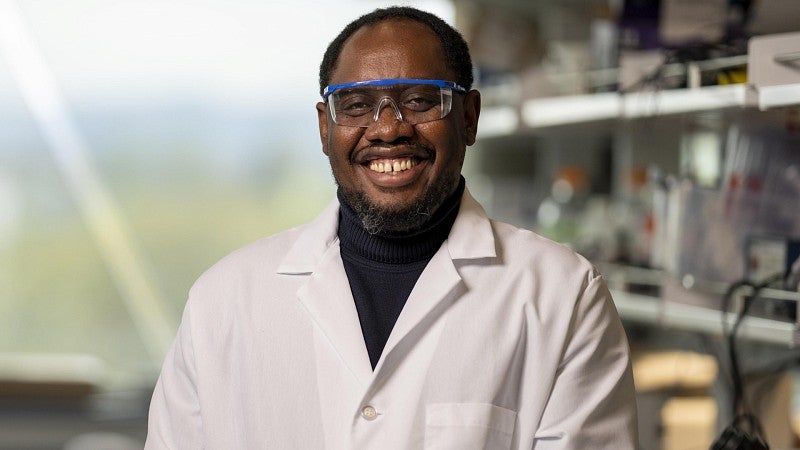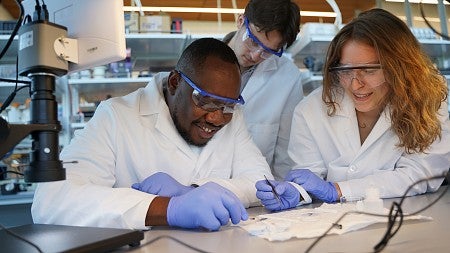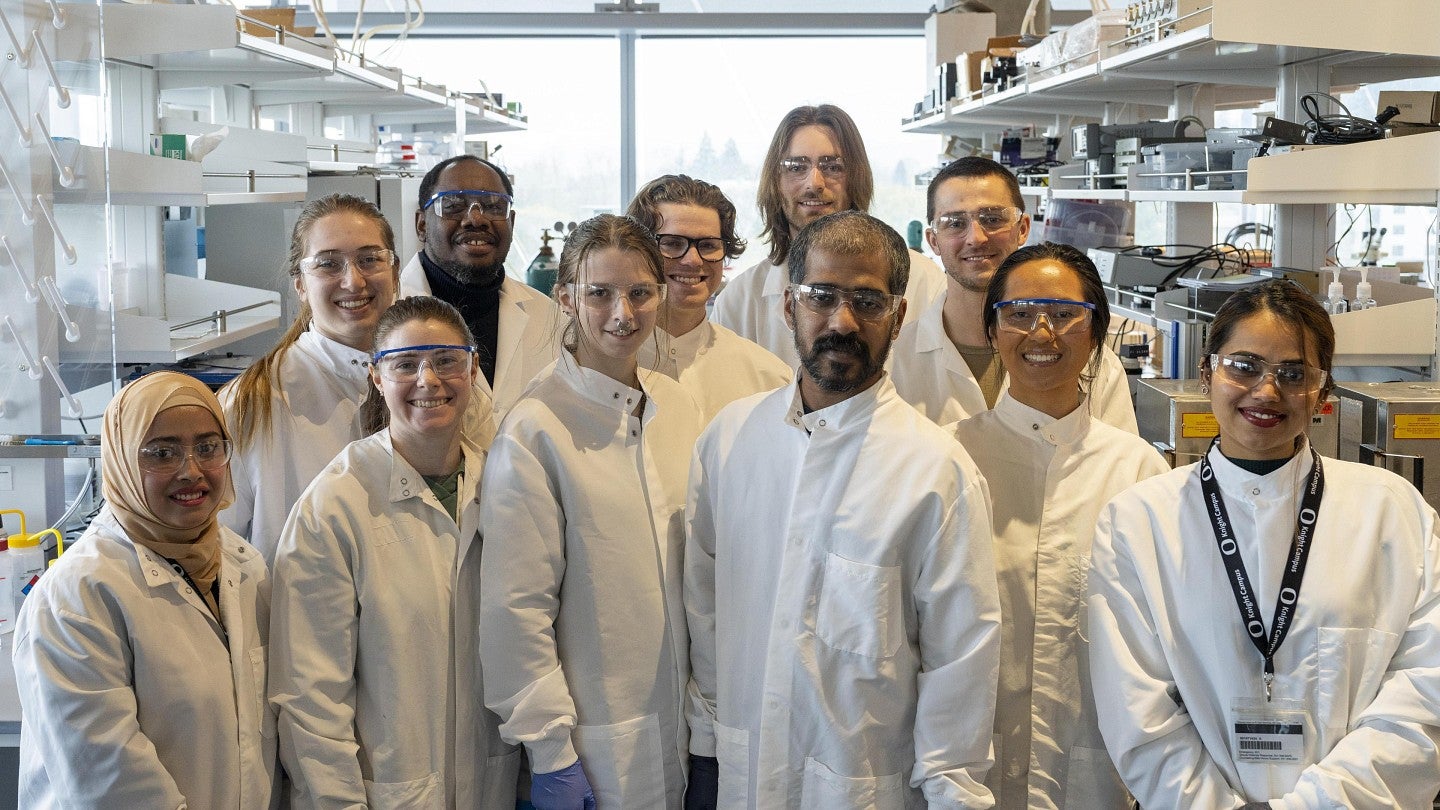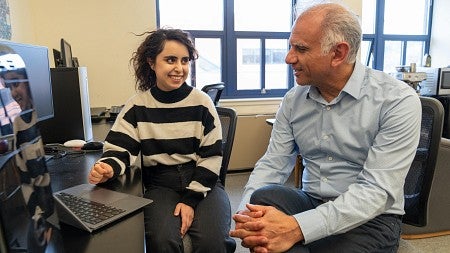
Building Better Brain Implants
Knight Campus researcher Felix Deku is designing tech to relieve symptoms of Parkinson’s, Alzheimer’s, depression, and more
By Laurel Hamers • Photos by Chris Larsen • April 3, 2024
6 min read
Felix Deku encourages his students to fail—and fail fast.
It’s one of the core tenets the neuroengineer uses to foster rapid innovation in his lab at the University of Oregon Phil and Penny Knight Campus for Accelerating Scientific Impact.
Deku’s engineering philosophy centers on iterative design—a cyclical approach of prototyping, testing, analyzing, and refining. “Basically, you come out with the dumbest idea, build a prototype, test its limit, and when it fails, you learn from the failure—then build the next less-dumb prototype, and the cycle begins again,” says Deku, the Betsy and Greg Hatton Assistant Professor in Neuroengineering.
Turning failure in the lab into a learning experience leads to a better product—one that won’t fail outside the lab, where it could cause harm. Deku’s team is trying to improve lives by building high-quality, long-lasting brain implants that relieve symptoms of conditions like Parkinson’s, epilepsy, depression, and dementia.
The idea behind brain implants is simple: these microelectrodes—thin, flexible structures a few millimeters long—are surgically placed into the brain, where they target specific neural circuits. The implant can be integrated with a tiny computer chip, also implanted into the brain. The devices send electrical signals that override or course-correct the faulty brain signaling that’s causing neurological problems.
Getting them to work in real life? Much more complicated. In particular, Deku’s lab is addressing a major barrier to widespread adoption of this emerging technology: the relatively short lifespan of these devices. Many implants designed to help patients with chronic, lifelong conditions fail after just six to twelve months.
Deku notes, “When technology fails, it’s the patients and their families who bear the brunt of the disappointment. They’re offered a glimpse of hope, a brief period where improvement seems possible, only to return to their prior condition.”
Deku envisions a better way.

He’s been developing neural implants since he was a graduate student at the University of Texas at Dallas in 2014. Eager to pursue projects with direct human impact, he hoped to join a cancer biology lab. But he ultimately switched his field to bioengineering and landed in a lab designing neural implants.
After graduate school he joined Neuralink, the brain implant company founded by Elon Musk. There, he led a microfabrication team and was instrumental in developing an FDA-approved neural implant system that has since been successfully implanted in a paralyzed patient. He later worked for Braingrade, another neural implant startup.
But in 2022, Deku was lured back to academia by the Knight Campus, which emphasizes translational research, shortening the time between discovery and societal impact.
“For me, the focus on translation was one of the key draws to come here to the Knight Campus,” Deku says. “Faculty here focus on getting products out from the bench to bedside.”
Deku’s lab is working to perfect a material that he began developing in graduate school. It could help solve a major problem in the rapidly growing field of neural implants—the poor reliability and longevity of these devices.
“We want to build a technology platform that can solve a lot of different issues, but with the goal that these implants are going to last longer than current devices,” Deku says.
Most neural implants are made of silicon, a versatile material commonly used in computer chips. But silicon corrodes in the saline environment of the brain, so these electrodes often wear out quickly. The field has moved to thin, flexible, polymer-based implants in recent years, but there are other challenges with their use.
Deku’s alternative, a kind of ceramic, holds up better. His team has shown that implants made from this material could potentially last decades without corroding. But it’s a challenging material from which to make electrodes.
Ceramics tend to be brittle—imagine how easily a porcelain teacup shatters. The brittleness comes, in part, from residual stress incorporated in the thin-film material as it forms. That intrinsic stress also makes the electrodes roll up instead of remaining straight. By controlling the way the material forms, Deku is working on ways to reduce the stress within the films and make a more pliable ceramic for brain electrodes.
“For me, the focus on translation was one of the key draws to come here to the Knight Campus. Faculty here focus on getting products out from the bench to bedside.”
—Felix Deku
His team tests the longevity of their electrodes by submerging them in a saltwater solution, heating them up to almost two hundred degrees Fahrenheit, and stimulating them with an electric signal as many as a billion times in a row. The idea is to simulate extreme conditions that accelerate the failure of the product. From that data, they can predict how long the device will last inside the more moderate environment of the brain.
It’s not lost on Deku that in seeking to build a better brain implant, he is competing with high-profile work driven by private industry.
Says Deku: “We’re trying to succeed in the face of multimillion-dollar companies. Yet our approach is rooted in scientific rigor, an element that can often be overlooked in the rapid tempo of the startup landscape.”
Instead, the Deku lab is supported largely by philanthropy, including support from the Donald and Delia Baxter Foundation
The Knight Campus positions the lab to turn research into a product, thanks in part to a top-of-the-line clean room where they can manufacture and test products. And a partnership with Oregon Health & Science University in Portland provides Deku’s team with a pathway to move promising technology from preclinical experiments into clinical testing.
The team is driven by a creative and thoughtful approach to science. Deku’s lab pulls in students with varied life experiences, personal identities, and academic interests—materials science, chemistry, engineering, neuroscience, and more. These diverse perspectives encourage lab members to look at problems in new and different ways.
“Whether you’re a postdoc with five years of experience or an undergrad who has no idea—I encourage you to just tell us what you think,” says Deku. “That diversity in the lab in terms of how we solve problems gets everyone engaged in our work.”

Deku encourages his students to engineer from what he calls “first principles”—that is, not being restrained by past experience when envisioning what the future could look like.
While past experience can be a useful guide, it can also hold one back, Deku says, limiting assumptions about what is possible. Instead, first principles thinking encourages approaching each task as a new problem to solve and breaking it down into fundamental components. By asking basic questions and considering limitless possibilities, scientists and engineers can avoid getting stuck in the trap of doing something a certain way just because that’s how it’s always been done.
“Sometimes you get stuck in it,” Deku says, “and the deeper you get, the more difficult it is to see the big picture.”
The team also dreams of working on even more complex health conditions.
The electrodes for people with depression or epilepsy are implanted just a few millimeters into the brain and target specific areas. But Deku is also interested in dementia—a more difficult problem, he says. Memory circuits are much more widely distributed and deeper in the brain—centimeters instead of millimeters. Electrodes would need to be implanted much deeper and touch more places in the brain, without interrupting other brain functions.
Using targeted stimulation to address memory disorders would be a new approach, Deku says. Many research teams and pharmaceutical companies seeking cures for Alzheimer’s and dementia focus on addressing defective proteins and their accumulation in the brain. Instead, Deku wants to solve the problem with electrical signaling, answering questions about how the brain forms memories and what goes wrong in dementia.
“Can we learn something that will help us recreate those memories in people?” Deku asks. It sounds futuristic, he adds—“and that’s why we’re excited about it.”
Laurel Hamers is a senior writer and editor of science and research communications for University Communications. She was previously a science writer and editor for the Howard Hughes Medical Institute and a reporter for Science News magazine.
Chris Larsen, MS ’18 (journalism), is a videographer and photographer with University Communications.




